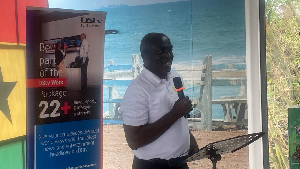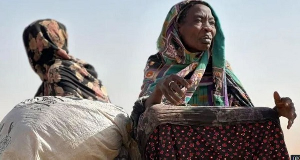Accra, May 3, GNA - Ms Ajoa Yeboah-Afari, Outgoing President of the Ghana Journalists Association (GJA) said without a free flow of information the aspirations of the people to social progress and better standard of life in larger freedom could not be realized.
It was for this reason that GJA reaffirmed its commitment to beliefs that there could be no true democracy without a free, independent and pluralistic media. Ms Yaboah-Afari said this at a symposium to mark 2006 World Press Freedom Day in Accra.
She said the theme: "The Role of The Media in Poverty Eradication" was most relevant, adding, "we believe that unless a vigilant press is free to shed light on matters affecting the well-being of the society they served, the problems that confronted the people-be it poverty, environmental degradation, human rights abuses, corruption, HIV/AIDS, terrorism, drugs trafficking child education and the empowerment of women would be harder to solve."
She said the theme was a reminder to take development journalism more seriously in order to pursue both the local and global development agenda.
Ms Yeboah-Afari urged journalists to use the freedom responsibly so that people would not be yearning for the bad old days of the Criminal Libel Law.
In a message read for Busumuru Kofi Annan, UN Secretary General, he said the media had a powerful influence on human behaviour and as such had an important role to play in promoting tolerance and respect for the freedom of religion and belief.
The media should not be vehicles for incitement or degradation or for spreading hatred; it must be possible to exercise discretion without encroaching on fundamental freedoms.
He urged journalists to recognize that national and global media not only report on change but were themselves agents of change. "We should all be grateful for the work and imagination of the press. I trust the old and new media practitioners alike would be able to continue their work unencumbered by threats of fear or other constraints.
Busumuru Annan said according to the committee to protect journalist, 47 were killed in 2005 and eleven lost their lives this year , adding that it was tragic and unacceptable that the number killed in line of duty had become a barometer for measuring press freedom. He urged all governments to reaffirm their commitments to the rights to "seek, receive and impart information and ideas through any media and regardless of frontiers' as set out in Article 19 of the Universal Declaration of Human Rights".
Mr Koichiro Matuura, Director General of UNESCO, in a speech also read for him, said more than one billion people lived on less than one dollar a day and another 2.7 billion lived on less than two dollars per day, adding that to combat these tragic statistics, the UN Millennium Declaration of 2000 made poverty eradication the highest priority among the goals of community development.
He said the first millennium development goal was that by 2015 the number of people living in extreme poverty and suffering from hunger should be reduced by half.
He said the day provided an occasion for considering the important questions of how a free press could help to eradicate poverty and how freedom of expression and press freedom could assist in achieving the Millennium Development Goals.
Mr Matuura said for the media to be effective in alleviating poverty they must be allowed to operate freely and safely. Mrs Gina Ama Blay, President of Ghana Private Newspaper Association of Ghana, appealed to the business community to assist in growing the private press in the country.
She appealed to media operators to be more responsible in their reportage since that was the sure way of enticing the business community to render their assistance towards the growth of the industry.
General News of Wednesday, 3 May 2006
Source: GNA












